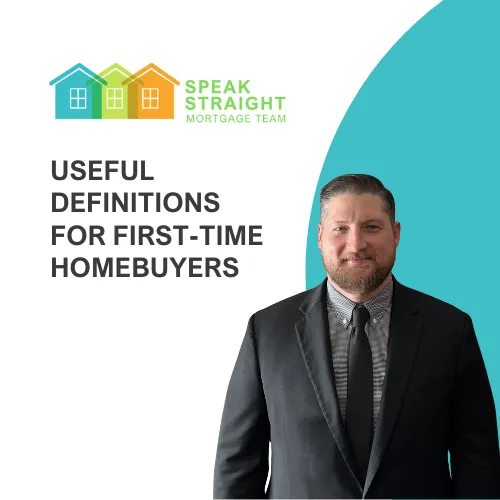
Useful Definitions For First-Time Homebuyers
Definitions That Every First-Time Homebuyer Needs to Know
Homebuying jargon can be confusing. But understanding these key terms helps you feel more confident and make informed decisions as you move through the mortgage process.
These are the definitions I found most helpful when I first entered the mortgage business—and they’ll be just as useful to you. I've organized them in the order you're likely to encounter them during your homebuying journey.
Debt-to-Income Ratio (DTI)
What it is:
A percentage that compares your monthly debt payments to your gross monthly income.
Why it matters:
Lenders use DTI to evaluate how much you can safely borrow. A lower DTI improves your chances of approval and may qualify you for better rates. Aim for 36% or lower, though some programs allow more if other factors (like credit score) are strong.
Prequalified vs. Preapproved
What it is:
Prequalified: A basic estimate of how much you might qualify for, based on self-reported numbers.
Preapproved: A mortgage expert has reviewed your actual documents—like pay stubs, bank statements, and credit—and confirms that you meet loan guidelines.
Why it matters:
Prequalification helps you set a price range. Preapproval gives you real negotiating power with sellers because it shows your finances have already been verified.
Points
What it is:
Points are prepaid interest. One point equals 1% of your loan amount.
Why it matters:
Buying points can lower your interest rate—and your monthly payment. Paying points upfront may save you money in the long run, especially if you plan to stay in the home for several years.
Mortgage Insurance
What it is:
Insurance that protects the lender if the borrower defaults. Usually required if your down payment is less than 20%.
Why it matters:
It allows you to buy a home with a smaller down payment. Mortgage insurance can be removed later—typically once you’ve paid down 20% of your home’s value.
Down Payment
What it is:
The upfront cash you contribute toward the home’s purchase—usually expressed as a percentage of the price.
Why it matters:
The more you put down, the less you need to borrow. A larger down payment may also lower your interest rate and help you avoid mortgage insurance.
Under Contract
What it is:
You and the seller have agreed on the terms and signed a contract, but the sale hasn’t closed yet.
Why it matters:
You're nearly there! A few final steps—like an appraisal and inspection—need to be completed before you officially own the home.
Closing Costs
What it is:
Fees due at closing, including lender fees, appraisal, title insurance, and more. Usually 2–5% of the purchase price.
Why it matters:
These costs can surprise buyers. The good news? At Speak Straight Mortgage, 95% of our loans come with $0 in lender fees.
Escrow
What it is:
An account that holds funds for property taxes and homeowners insurance, collected as part of your monthly mortgage payment.
Why it matters:
Instead of paying taxes and insurance separately, your lender pays them for you from the escrow account—making budgeting simpler and helping you avoid big lump-sum bills.
Final Thought
Be confident in your home loan journey. If you're ready to explore how much home you can afford, we’re here to help.
At Speak Straight Mortgage, we believe in making things simple, clear, and honest—just like our name says. https://speakstraightmortgage.com/
Get Clarity on the buying process. Schedule an appointment here https://links.empowerlo.com/widget/booking/t9otZCJe733FJR4INdfk
